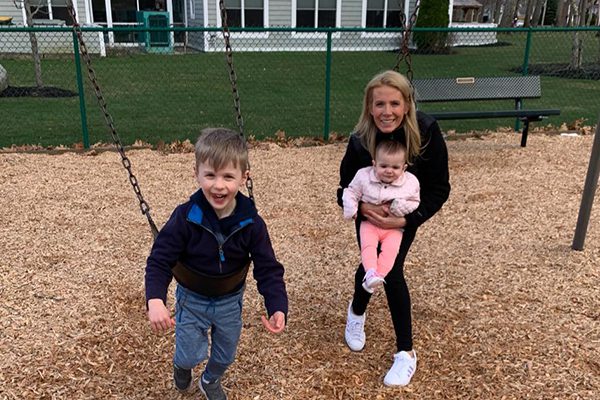May 9, 2022
Infant Sibling Research Project is Changing Lives – Heather Hegedus Case

Updated: February 12, 2023
When Boston25 News Anchor Heather Hegedus was pregnant with her daughter, she reached out to The New England Center for Children (NECC) to enroll her second-born child in the Infant Sibling Research Project.
“When we got our diagnosis, Boston Children’s told us studies now say that as many as one in four siblings of children with autism also have autism,” Hegedus, whose 3-year-old son was diagnosed with autism when he was 18 months old, shared on Facebook in honor of Autism Awareness month. Her daughter, who will turn a year old this month, is thriving in the study.
Since 2018, a team of NECC researchers have been inspiring hope for many parents of infants who also have a child on the autism spectrum, like Hegedus, through the Infant Sibling Research Project, which aims to detect early markers for autism in infants so that with appropriate early intensive behavior intervention (EIBI), these babies could gain the skills they need to develop typically. Being able to access the support and expertise of NECC’s team when it comes to her daughter has been life altering for Hegedus and her family.
“They have gone above and beyond their jobs as researchers and have been great support systems and so reassuring and compassionate when I had questions and concerns about our daughter,” she shared. “They understand we still have PTSD from getting the unexpected diagnosis of autism with our first child and they patiently answered my questions and worked through my concerns with me. If it wasn’t for having them in our home every few weeks, I don’t think I’d be enjoying my daughter as much as I’ve been able to because I’d always have worries in the back of my mind.”
NECC’s Project was inspired by a study that was done in 2017 by the Wisconsin Early Autism Project that demonstrated early identification of autism symptoms followed by immediate intensive behavioral intervention had a positive effect on the infants studied.
Dr. Becky MacDonald and the Infant Sibling Research Project
Dr. Becky MacDonald, BCBA-D, LABA, clinical psychologist and senior program director at NECC, has been leading the Infant Sibling Research Project since its inception. There are currently 91 infants enrolled, with 59 of them being high-risk infant siblings. Through this program, Dr. MacDonald and her team have developed an Early Assessment Tool that can be used with infants from birth to 18 months old. Thirteen babies have been identified with symptoms since the program began. They fall into two categories: babies who show symptoms before six months and babies who show symptoms after 12 months. According to Dr. MacDonald, most of the early symptomatic babies have been responsive to parent coaching and do not have a diagnosis. The later onset babies who showed symptoms after 12 months are receiving 1:1 ABA therapy for 15-30 hours a week and doing well.
“Data has shown that signs of autism can emerge as early as the first two months of life, and that with early intervention with an ABA therapist, these symptoms can be remediated.” said Dr. MacDonald. “At NECC, we are evaluating newborn infants whose siblings have an autism diagnosis. It is our hope that through this research we can identify these early markers and address symptoms of autism before 18 months. This project has implications not just for the immediate students and families we serve, but also for future generations of children with special needs.”
Hegedus and her Son
Hegedus shared that her son “was delayed in all of his milestones and nothing came innately to him— he didn’t know how to play/pretend play, he didn’t respond to his name, his eye contact was poor, he didn’t point, and he did not exhibit much joint attention with toys and books.” Because some of these skills can be taught, Hegedus said she and her husband are supporters of early intervention. “[We] believe that in order to have the best outcomes and for children to learn life skills that will help them be as independent as possible someday, it is crucial that autism is diagnosed as early as possible so that early intervention can start.”
Hegedus added that their experience with the Project has been “wonderful and reassuring and extremely positive. Thanks to [Dr. MacDonald] and her team, I’m living in the moment more and savoring all of the special moments we’ve had with our baby girl. While there are no guarantees—and I still hold my breath a lot—I’m a lot less worried about the future and I’m able to be excited for it!”
For more information on NECC’s Infant Sibling Research Project, visit the website.